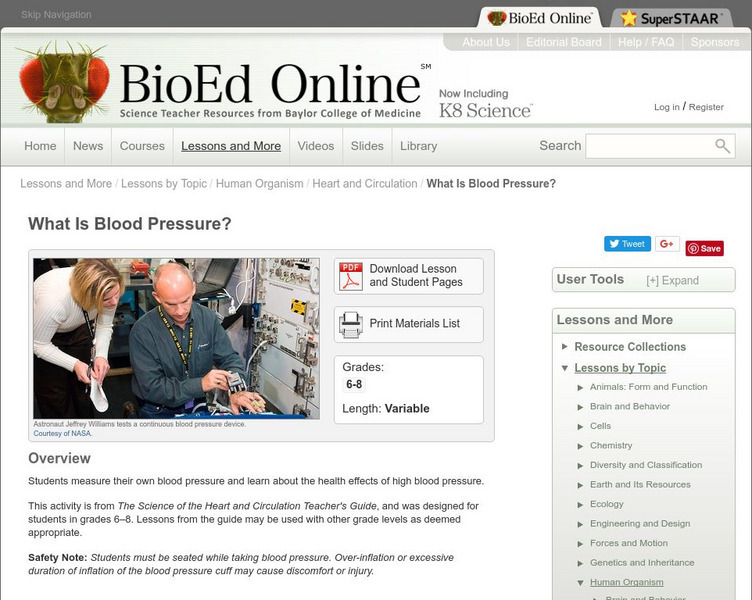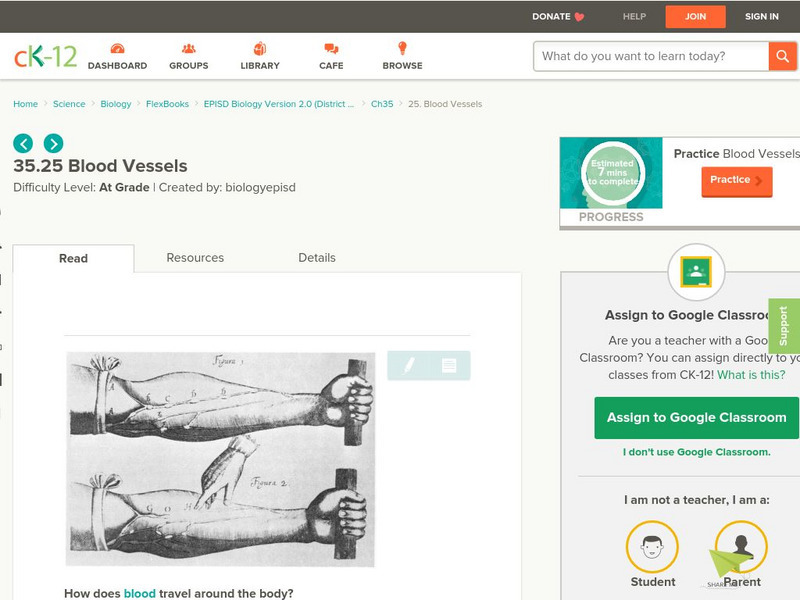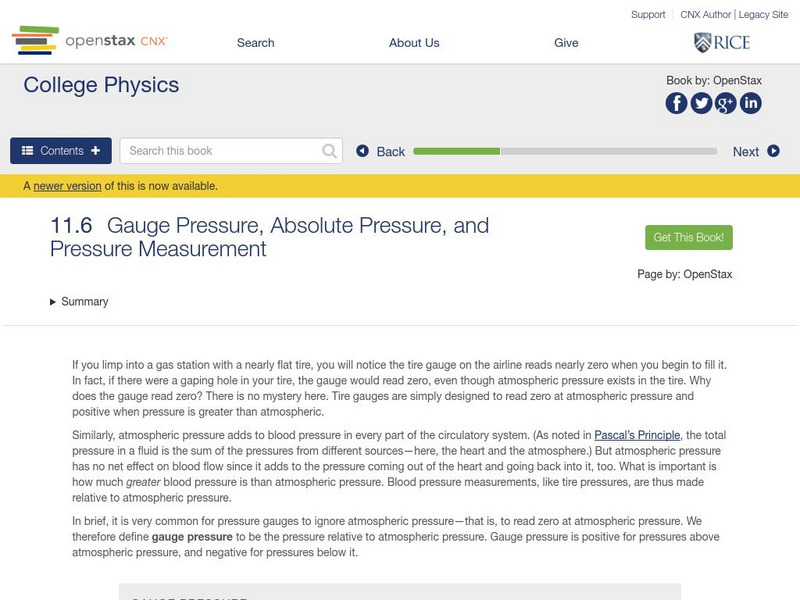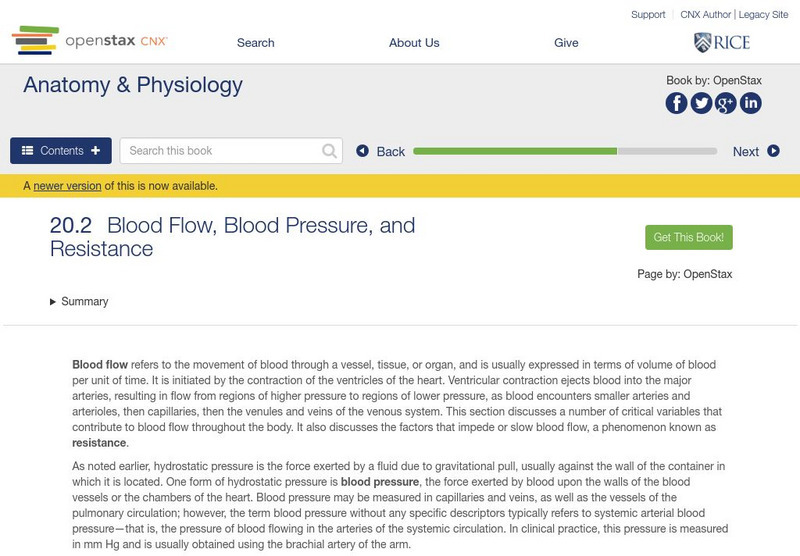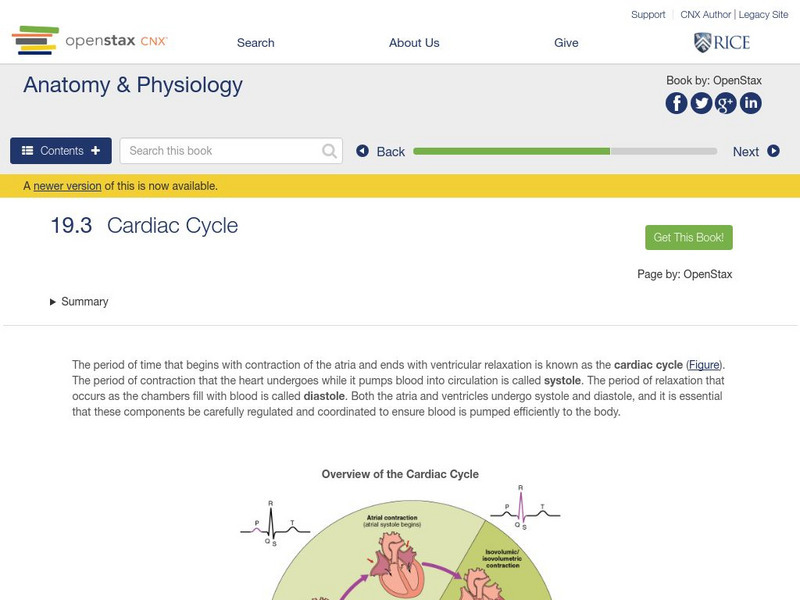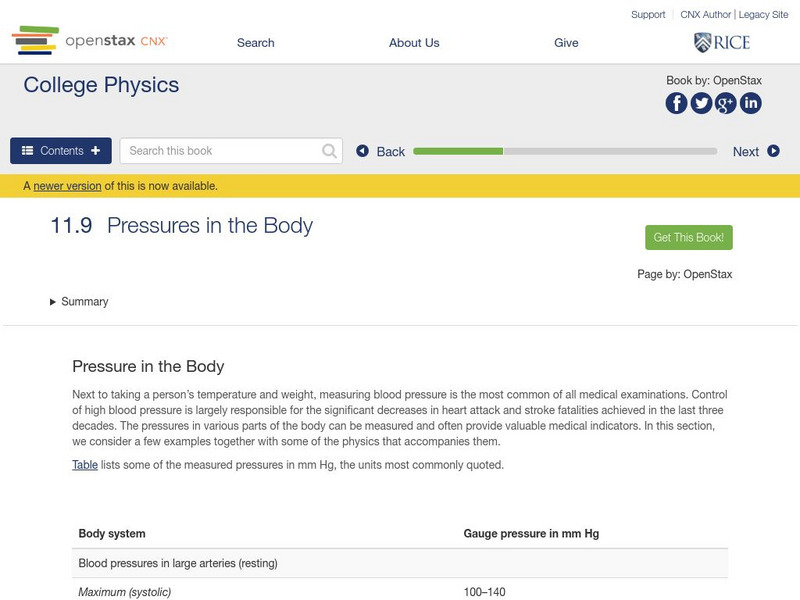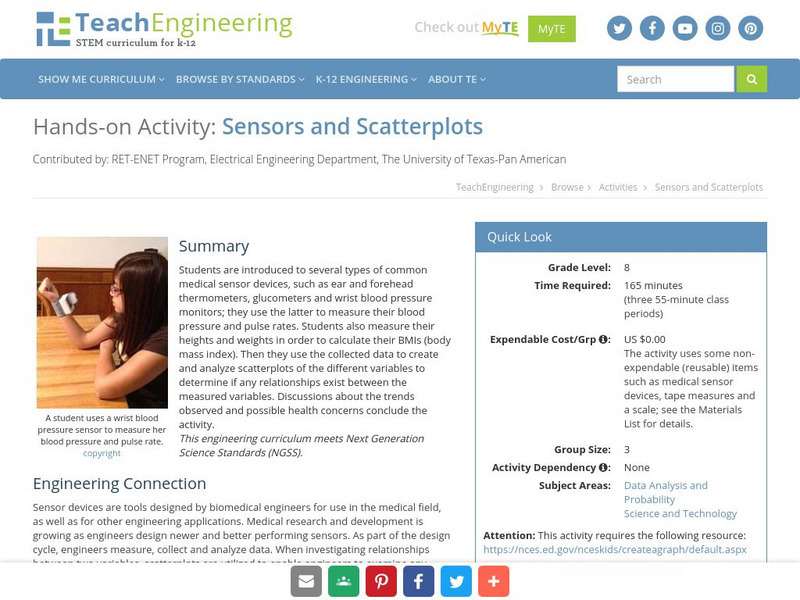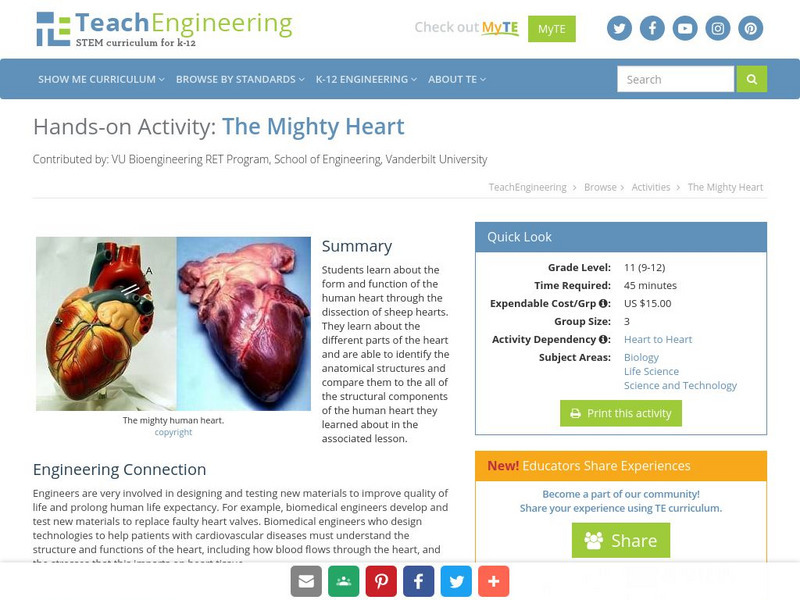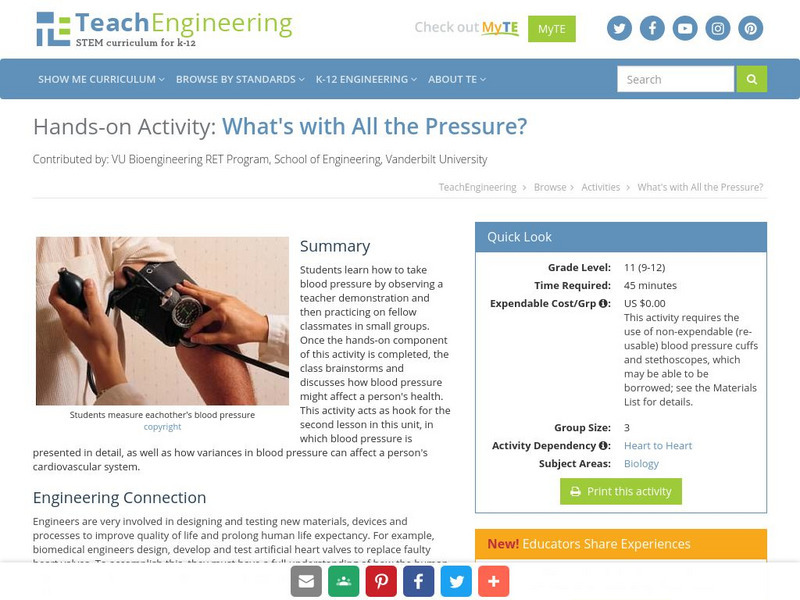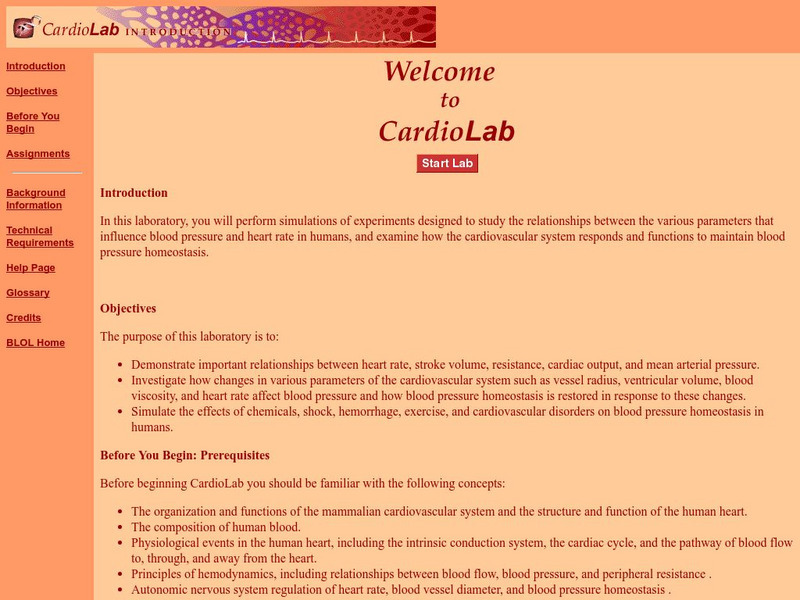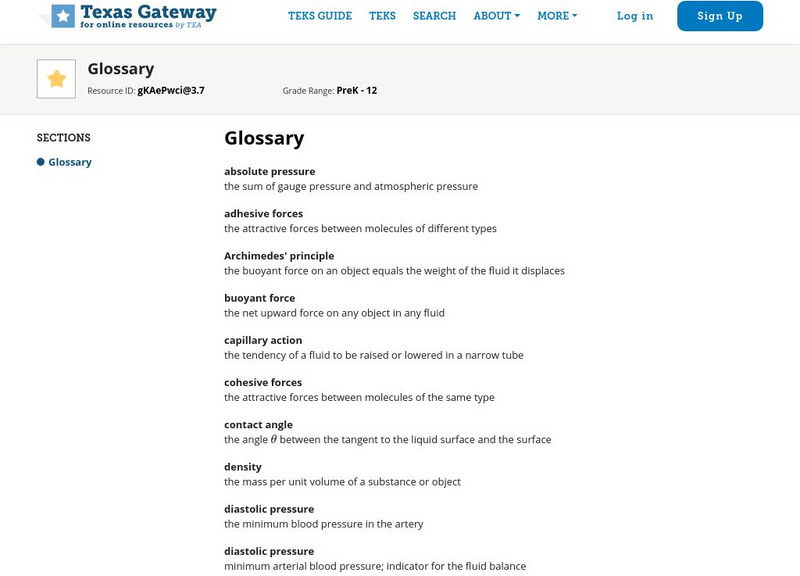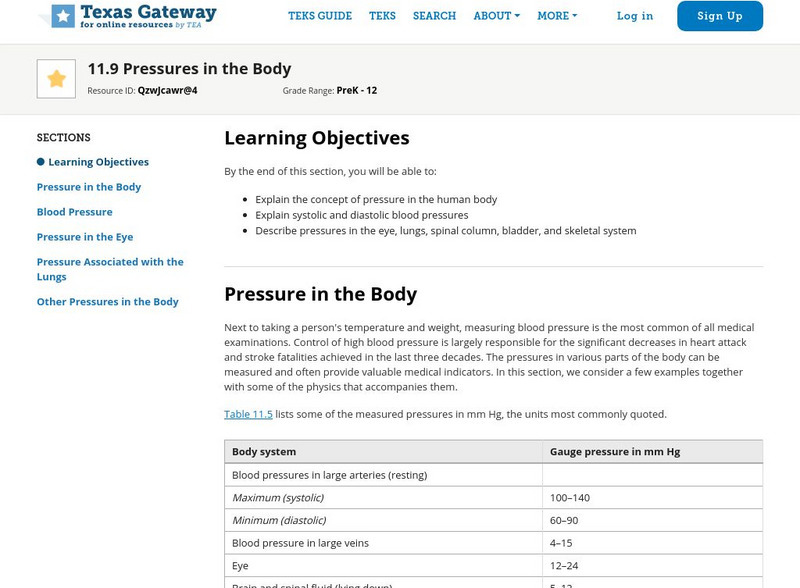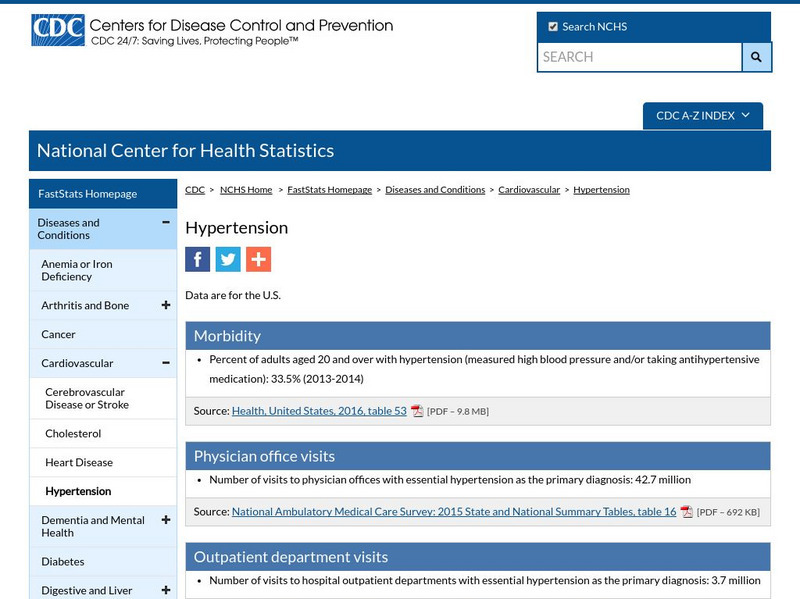The Association of the British Pharmaceutical Industry
Abpi: Heart and Circulation
A complete, self-paced lesson on the heart and circulation. Students work their way through illustrations and animated tutorials, and answer review questions along the way. There is a self-checking quiz at the end of the lesson.
BioEd Online
Bio Ed Online: Heart: Basic Measurements
In this lesson plan students are introduced to heart-related data, such as blood pressure and oxygen saturation. They will also learn basic information about the heart and circulatory system.
BioEd Online
Bio Ed Online: What Is Blood Pressure?
In this lesson students measure their own blood pressure and learn about the health effects of high blood pressure.
Open Curriculum
Open Curriculum: Circulatory System
Detailed information about the many functions and components of the cardiovascular system. Also looks at the lymphatic system and cardiovascular disease.
CK-12 Foundation
Ck 12: Blood Vessels
[Free Registration/Login may be required to access all resource tools.] In this online tutorial students will learn how to compare different types of blood vessels and their roles.
OpenStax
Open Stax: Gauge Pressure, Absolute Pressure, and Pressure Measurement
From a chapter on Fluid Statics in a Physics textbook. This section of the chapter looks at the definitions of gauge pressure and absolute pressure, and how barometers work. It also discusses how blood pressure is measured. Includes...
OpenStax
Open Stax: Anatomy & Physiology: Blood Flow, Blood Pressure, and Resistance
Learn about the components and measurement of arterial blood pressure, as well as the variables affecting blood flow and blood pressure in this learning exercise.
OpenStax
Open Stax: Anatomy & Physiology: Cardiac Cycle
Students learn the structure and function of the cardiac muscle and study the components of the conducting system that distributes electrical impulses through the heart during the cardiac cycle.
OpenStax
Open Stax: Pressures in the Body
From a chapter on Fluid Statics in a Physics textbook. This section of the chapter covers the different types of fluid pressures in the human body and how they are measured. Includes problems and exercises.
TeachEngineering
Teach Engineering: Sensors and Scatterplots
Students explore the use of several biomedical engineering sensor devices, and then use the collected data to create and analyze scatterplots of the different variables to determine if any relationships exist between the measured...
TeachEngineering
Teach Engineering: The Mighty Heart
Students learn about the form and function of the human heart through the dissection of sheep hearts. They learn about the different parts of the heart and are able to identify the anatomical structures and compare them to the all of the...
TeachEngineering
Teach Engineering: What's With All the Pressure?
Students learn how to take blood pressure by observing a teacher demonstration and then practicing on fellow classmates in small groups. Once the hands-on component of this activity is completed, the class brainstorms and discusses how...
TeachEngineering
Teach Engineering: Heart to Heart
Students learn about the form and function of the human heart through lecture, research and dissection. They brainstorm ideas that pertain to various heart conditions and organize these ideas into categories that help them research...
TeachEngineering
Teach Engineering: Blood Pressure Basics
Learners study how heart valves work and investigate how valves that become faulty over time can be replaced with advancements in engineering and technology. Learning about the flow of blood through the heart, students are able to fully...
US Food and Drug Administration
U.s. Food and Drug Administration: High Blood Pressure (Hypertension)
Focuses on the basics of the disease high blood pressure (hypertension) such as risk factors, signs, effects, and control; specifically in women.
American Heart Association
American Heart Association: Low Blood Pressure
Presents low blood pressure as a common side effect of pregnancy, some medications, and other circumstances, but as an indication of a potential problem if associated with a provided list of warning signs and symptoms.
Other
California State University: Biology Labs Online: Cardio Lab
A comprehensive set of virtual experiment assignments where students explore the roles of blood pressure and heart rate in maintaining a balanced cardiovascular system. Includes background information, glossary, online notebook, and...
American Heart Association
Aha: Monitoring Your Blood Pressure at Home
Article from the American Heart Association entitled "Monitoring Your Blood Pressure at Home." Discusses AHA recommendations on choosing a monitoring device and how to use it properly. It also provides a blood pressure chart and links to...
PBS
Pbs Learning Media: Body Control Center
Throughout the day, your nervous system monitors and makes endless adjustments to your body's basic systems--all to keep you alive. This interactive feature illustrates the complexity of such a task.
National Institutes of Health
Nih: The Heart Truth: A Campaign for Women About Heart Disease
This comprehensive resource offers information about cardiovascular diseases for women and includes major risk factors.
Texas Education Agency
Texas Gateway: Fluid Statics: Glossary
This is a glossary of terms and definitions used in Chapter 11: Fluid Statics from the AP Physics online text.
Texas Education Agency
Texas Gateway: Fluid Statics: Pressures in the Body
By the end of this section, you will be able to explain the concept of pressure in the human body; explain systolic and diastolic blood pressures; and describe pressures in the eye, lungs, spinal column, bladder, and skeletal system.
Texas Education Agency
Texas Gateway: Gauge Pressure, Absolute Pressure, and Pressure Measurement
By the end of this section, you will be able to define gauge pressure and absolute pressure and to understand the working of aneroid and open-tube barometers.
Centers for Disease Control and Prevention
Centers for Disease Control: Fast Stats a to Z: Hypertension
Statistical data provided by the Center for Disease Control and Prevention. This site offers US figures on hypertension, its prevalence and who it generally affects. Other data can be downloaded.




